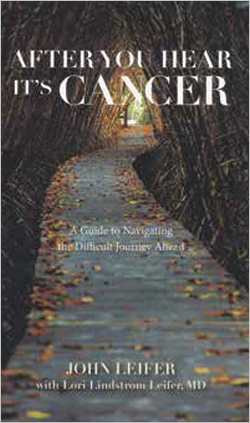REVIEWED BY SR. SUSAN O’CONNOR, RSM, MSW, MA
 AFTER YOU HEAR IT'S CANCER: A GUIDE TO NAVIGATING THE DIFFICULT JOURNEY AHEAD
AFTER YOU HEAR IT'S CANCER: A GUIDE TO NAVIGATING THE DIFFICULT JOURNEY AHEAD
By John Leifer with Lori Lindstrom Leifer, MD
Rowman and Littlefield, 2015 320 pages, $36
For full disclosure, I am a two-year ovarian cancer survivor and a former medical social worker, including hospice, so I may approach After You Hear It's Cancer a bit differently than some other readers. In some ways the book is a personal story, for contributor Lori Lindstrom Leifer, MD, the author's wife, is a breast cancer survivor as well as a radiation oncologist. The book, however, is much more comprehensive. Early on, we are introduced to 10 individuals dealing with a variety of different cancers, different treatments and even different outcomes. Quotations from these men and women are interspersed throughout the book, so their experiences became very real. It is easy for cancer patients and caregivers to find at least one other story with which to identify.
There were many things I appreciated about After You Hear It's Cancer, including its ability to give factual information without too much jargon and to clearly define the acronyms that are so common and confusing in health care. It is rare to find a book that speaks so clearly to such a variety of constituents, and it would have great value to health care workers, patients and families/caregivers along the whole cancer journey.
I read the book cover to cover, but it doesn't need to be read that way: each chapter can stand alone and would benefit an individual wherever he or she is on the entire spectrum of dealing with cancer. For example, if you are concerned about costs, you can go directly to that chapter and find basic information, along with suggestions on sources of help and possible questions to ask members of the health care team. The same is true for things such as finding the right doctor, exploring various treatment options and asking for a second opinion.
I think a word to describe After You Hear It's Cancer as a whole would be “empowering.” Being armed with accurate, understandable information helps people become active participants in their care and can foster self-determination. Knowledge and options can help move cancer patients from feeling victimized or overwhelmed to feeling more in control of a situation not of their choosing. As the book puts it, “Despite your lack of medical training, you can nonetheless play an important role in determining your treatment. The question is whether you will step up to the plate and assume a degree of control for the management of your cancer.”
The authors don't shy away from providing information on potentially controversial topics such as alternative therapies — again, the premise is that information is empowering, and when the information is delivered in a nonjudgmental manner, receiving that information helps individuals make decisions that are best for them.
Suggestions regarding getting psychological help, either as a patient or a caregiver, are presented in a very positive manner and not as something to pursue because you are a failure in the realm of cancer care. I think the authors strike a good balance between giving information, providing encouragement and normalizing a situation that can feel out of control.
I definitely want to call attention to the last part of the book — what a wealth of solid, practical information. Sources used for the book are well documented and offer credibility to the work, but perhaps even more important is that the sources can be a lifeline to more information if desired by professionals, patients and caregivers. The resource section, bibliography and index also offer many paths to in-depth information, which for some cancer patients and caregivers is an essential part of their cancer journey. After I finished reading the book, I went through the index and found the topics very helpful for reviewing some areas I found particularly informative or challenging.
This book would be very appropriate in a waiting room, in a health care professional's office or to have at home as a valuable source of information. As the cancer journey continues, different topics take on added meaning — at the start, treatment options would be a priority, but later on, the information on being a survivor would be of greater value. Some cancer journeys also will require information on palliative care, hospice services and other end-of-life considerations, all of which are covered, as well.
In short, everything for the cancer journey is readily available in this book — a very valuable resource indeed.
SR. SUSAN O'CONNOR, RSM, is vice president, mission integration, at Mercy Medical Center, Cedar Rapids, Iowa.